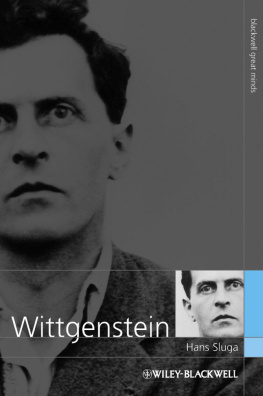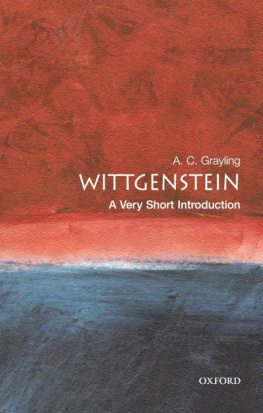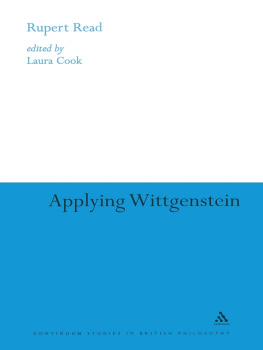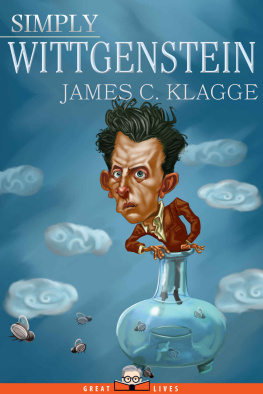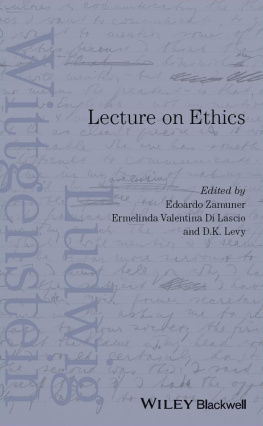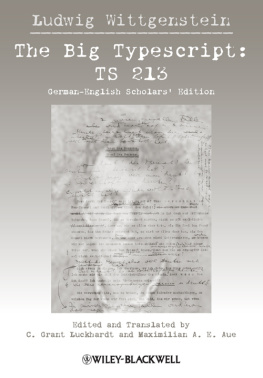blackwell great minds
edited by Steven Nadler
The Blackwell Great Minds series gives readers a strong sense of the fundamental views of the great western thinkers and captures the relevance of these figures to the way we think and live today.
Kant by Allen W. Wood
Augustine by Gareth B. Matthews
Descartes by Andr Gombay
Sartre by Katherine J. Morris
Charles Darwin by Michael Ruse
Schopenhauer by Robert Wicks
Shakespeares Ideas by David Bevington
Camus by David Sherman
Kierkegaard by M. Jamie Ferreira
Mill by Wendy Donner and Richard Fumerton
Socrates by George H. Rudebusch
Maimonides by T.M. Rudavsky
Wittgenstein by Hans Sluga
This edition first published 2011
2011 Hans Sluga
Blackwell Publishing was acquired by John Wiley & Sons in February 2007. Blackwells publishing program has been merged with Wileys global Scientific, Technical, and Medical business to form Wiley-Blackwell.
Registered Office
John Wiley & Sons Ltd, The Atrium, Southern Gate, Chichester, West Sussex, PO19 8SQ, United Kingdom
Editorial Offices
350 Main Street, Malden, MA 02148-5020, USA
9600 Garsington Road, Oxford, OX4 2DQ, UK
The Atrium, Southern Gate, Chichester, West Sussex, PO19 8SQ, UK
For details of our global editorial offices, for customer services, and for information about how to apply for permission to reuse the copyright material in this book please see our website at www.wiley.com/wiley-blackwell.
The right of Hans Sluga to be identified as the author of this work has been asserted in accordance with the UK Copyright, Designs and Patents Act 1988.
All rights reserved. No part of this publication may be reproduced, stored in a retrieval system, or transmitted, in any form or by any means, electronic, mechanical, photocopying, recording or otherwise, except as permitted by the UK Copyright, Designs and Patents Act 1988, without the prior permission of the publisher.
Wiley also publishes its books in a variety of electronic formats. Some content that appears in print may not be available in electronic books.
Designations used by companies to distinguish their products are often claimed as trademarks. All brand names and product names used in this book are trade names, service marks, trademarks or registered trademarks of their respective owners. The publisher is not associated with any product or vendor mentioned in this book. This publication is designed to provide accurate and authoritative information in regard to the subject matter covered. It is sold on the understanding that the publisher is not engaged in rendering professional services. If professional advice or other expert assistance is required, the services of a competent professional should be sought.
Library of Congress Cataloging-in-Publication Data
Sluga, Hans D.
Wittgenstein / Hans Sluga.
p. cm. (Blackwell great minds ; 13)
Includes bibliographical references and index.
ISBN 978-1-4051-1847-7 (hardcover : alk. paper) ISBN 978-1-4051-1848-4 (pbk. : alk. paper)
1. Wittgenstein, Ludwig, 18891951. I. Title.
B3376.W564S58 2011
192dc22
2011009297
A catalogue record for this book is available from the British Library.
This book is published in the following electronic formats: ePDFs ISBN: 9781444343281; Wiley Online Library ISBN: 9781444343311; ePub ISBN: 9781444343298; Mobi ISBN 9781444343304
preface
Ludwig Wittgenstein is, without doubt, a decisive figure in twentieth-century philosophy. In the radicalness of his questioning, in his determination to reshape the philosophical landscape, and in the power of his thinking and language he can be compared only to Martin Heidegger, who was his exact contemporary and came from an adjoining region of Europe. Why the two most original philosophical thinkers of the last century stemmed from related backgrounds can be understood only when we realize that all great philosophizing originates from a context of (social, political, cultural) endangerment. Plato and Aristotle shared such a context and so did Descartes and Hobbes, and so did, finally, our two twentieth-century thinkers.
Wittgenstein and Heidegger lived through a particularly turbulent age in which European world domination came to an end in a series of painful contractions; they were born as Europes cultural crisis (the crisis of modernity) was becoming acute, and grew up in an area particularly exposed to its disruptions. These developments affected the two philosophers, however, in somewhat different ways. In a previous book I have sought to characterize Heideggers philosophizing in the historical and political context of his time. Here I am looking at Wittgensteins philosophical thought with an eye to our political realities. The circumstances of Wittgensteins life are, certainly, of the greatest interest in this respect. The philosopher belonged to a talented and successful family that occupied a pivotal place in the Austro-Jewish culture of late imperial Vienna at a moment of last flourishing and incipient disintegration. Many of Austrias cultural elite were associated with the Wittgenstein family and with the philosopher himself (Johannes Brahms, Gustav Mahler, Sigmund Freud, Gustav Klimt, Adolf Loos, Karl Kraus). When he took up philosophy, Wittgenstein also came to know some of the most creative philosophical thinkers of the age, men like Gottlob Frege, Bertrand Russell, G.E. Moore, Moritz Schlick, and Rudolf Carnap. In England, where he spent large parts of his adult life, he became in addition acquainted with leading intellectuals like John Maynard Keynes, Lytton Strachey, and Alan Turing. This glittering background stands, however, in sharp relief to Wittgensteins foreboding sense of the darkness of his time and to his feeling of alienation from European and American civilization. While his work incorporates all the impulses he had received from this civilization he sought at the same time to overcome it in his thinking. An heir to the rich heritage of modern European philosophy and culture, he saw himself nonetheless as a man alone at the crossroads.
My primary goal in this book is to make Wittgensteins thought transparent for readers who have as yet little or no familiarity with it. I begin with an account of Wittgensteins life in order to illuminate the historical, political, and personal conditions from which his philosophical work emerged. The chapters that follow seek to identify some of the key concepts and ideas in Wittgensteins work. Given the scope of that work, I will have to omit much detail. My exposition will also more or less bypass what the experts have said about Wittgensteins thought. I will seek to present Wittgensteins thought, instead, predominantly in my own words. Knowledgeable readers will come to understand very quickly that the selection of topics and the emphases I have chosen in this book are very much my own. Philosophical texts are, after all, like the puzzle pictures that interested Wittgenstein so much. They can always be seen in more than one way. I will argue in Chapter 8 that because of the cultural and political changes that Wittgenstein and his contemporaries lived through, and in consequence of the no less dramatic changes in the way we live now, our deepest and most pressing problems must concern the conditions and the possibility of our human social and political existence. In examining Wittgensteins ideas and concepts I am therefore particularly interested in asking how they relate to the historical and political context in which they arose and how they might be used in understanding that context. In the last chapter I will try to summarize these observations by asking how Wittgensteins thought may help us to face the peculiar problems of our contemporary social and political existence.

